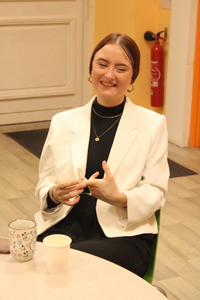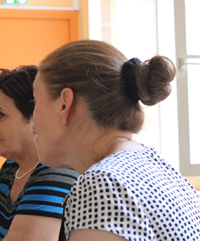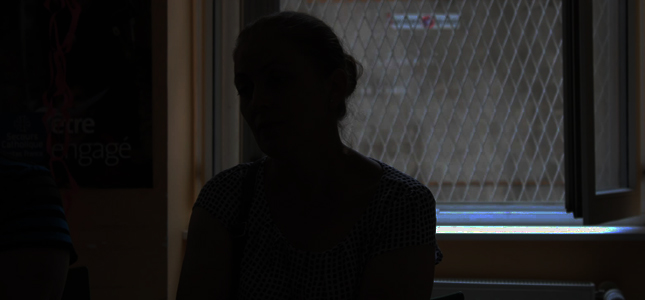
Dora Pozsgai
Photo credit Athénaïs LACHAT In the photo above: Dorina racontant son experience Photo credit Anastasia Papadopoulos
Dorina spent 8 years trying to raise her children, without her husband, living with her in-laws. She worked 12 hours a day, while cleaning the house and caring for her sick father-in-law. All this at the risk of suffering psychological, economic and physical violence. A human story.
By Dora Poszgai, student, University of Political Sciences, Nancy. Translation in English from the original in French by Dora Poszgai. Editor Elda Spaho Bleta
"Many people ask," says Dorina*, "why I left my country, why I came here, to France." Yes, her story is complex. The first step towards its understanding is to realize that most of migrants do not leave their country of their own free will. They are fleeing from something: war, political issues, poverty, obviously - but also personal difficulties. They have a reason to leave, to quit their family and home.
A marriage full of violence
Four years ago, Dorina, a mother of two, fled fear and harassment in Albania and headed to France, to raise her children properly. Although on the path to modernization, the patriarchal Balkan society remains strongly rooted in traditions and customs determining the hierarchical social and family structure. Women are still subordinate to men. Dorina got married in 2000 and gave birth to two children in 2002 and 2007. With her children and husband, she lived in the house of her husband's elderly parents to look after them. She was dominated and abused not only by her husband, but also by his parents.
-Once I did not close the window and my father-in-law hit me with his crutches, - she says. -His violence against me was always justified since he was old and ill. There was nothing I could do about it.
-And your husband? Did he hit you too?
- Yes. Always. He hit me for everything. So, I stopped talking. I didn't want any more conflicts. I didn't want any more problems.
According to the 2018 National Population Survey on "Violence against women and girls in Albania"1 (conducted by INSTAT, the official Statistical Institute in Albania), more than half of Albanian women and girls aged 15-74 have experienced violence in their lifetime. Moreover, 47% of them have experienced domestic violence by their intimate partner.
In 2006, the Albanian legislature ratified the law on "Measures against violence in family relations" to reduce domestic violence towards women. The law clearly defines domestic violence as any act of violation of physical, moral, psychological, sexual, social and economic violence committed between persons who are or have been in a family relationship2. In addition, through amendments in 2012 and 2013, the Criminal Code of the Republic of Albania3 was revised to include domestic violence as an offence punishable by imprisonment.
In reality, however, the situation still differs significantly from the theory, as women who experience domestic violence usually do not report it to competent legal institutions. The main cause of the under-reporting of domestic violence lies in social norms. According to the above-mentioned INSTAT survey1, 46.5% of women aged 18-74 stated that all or most members of their community "think that a woman should tolerate some violence in order to keep her family together".
"I have never gone to the police, as this is the norm in Albania. It was almost always like this. My mother-in-law would not have allowed me, anyway,"says Dorina.

Photo credit Anastasia Papadopoulos
8 years of abandonment and, then, France
After confrontations with his business partners and trouble with the authorities, her husband left the family in 2010, leaving no trace behind. Dorina has spent 8 years struggling to raise her children in his absence, taking care of her parents-in-law as well. She has worked 12 hours a day while keeping the house and caring for her sick father-in-law. She has done this everyday, for 8 longs years, despite psychological, economic and physical abuse from her parents-in-law. She has tried to survive in an exploitative and abusive household.
One day, however, she eventually decided that it was enough: she could no longer lead this life. And she knew that there was no one to help her. "I decided to leave my country to find better life conditions for my children. And for me too."
She came to France with, in her mind, a welcoming image of this country. Hoping for a new start - for a new life, calm and safe.
"I was no longer able to stay in Albania. I could not do it anymore," she explains. " I did not come to take advantage of France. I don't want charity. I came to work, to raise my children with my work.”
However, what she found was so different from what she hoped. Instead of hospitality, work opportunities, acceptance and options, she has experienced 4 long years of helpless waiting and a precarious financial situation, due to the impossibility to work without residence and work permit.
"When we arrived, we had to sleep in barracks. For two months. Then again for six more months. Each of us had no more than a long chair and a blanket. We were nearly 30 personness living in the same room," Dorina recalls the sufferings of the first months in France with pain and disappointment in her voice.
After having spent months in barracks, the family obtained a spare room in an accommodation facility for asylum seekers.
Dorina applied for protection at the French Office for the Protection of Refugees and Stateless Persons (OFPRA), receiving legal assistance and an interpreter. "Everyone has the right to seek and to enjoy in other countries asylum from persecution," says Article 14 of the 19484 Universal Declaration of Human Rights. Refugee and/or subsidiary protection status is recognised by OFPRA based on the 1951 Geneva Convention5. In practice, however, most Albanian immigrants are not eligible for asylum as Albania is considered a safe country6. Nevertheless, Albanian immigrants remain eligible to apply for subsidiary protection, which is granted to persons who have serious and proven grounds to suspect a real risk of being exposed to serious harm7.
Dorina applied for subsidiary protection, which was rejected in 2019 on the grounds of insufficient evidence to prove harassment and threats, thus not justifying the need for subsidiary protection. Her only remaining option is to obtain legal recognition of her status on other grounds, thereby qualifying her for a residency permit. The Valls circular of 28 November 20128provides indications on the regularization procedure. For Dorina, there are two possibilities: legalization based on family life, which requires 5 years of residence in France and at least 3 years of school attendance for at least one child; or legalization based on work, which requires 3-5 years of residence in France, and a work contract or promise of employment, as well as a specific number of pay slips. However, the Valls Circular is nonbinding, meaning that even if the conditions set out in the circular are met, legalization is not guaranteed.
Contrary to the negative perception of immigrants, Dorina has the desire to work. When living in Albania, her country of origin, she worked as a seamstress for well-known franchises such as Lacoste, Max Mara, etc., and she is keen to continue her profession in France. Searching for a job is an important part of her daily activities, but she has not yet found anything. Her only option, being without papers, is to work undeclared. But the risk of legal sanctions against employers, renders finding a job difficult.
"It's like a vicious circle. I would like to work, but they will not let me. Because I need papers. But I cannot get the papers because I have no a work contract. »
The family of three, with no income, receives help from associations, grants, and, when necessary, some financial support from their family in Albania. Dorina spends her daily life with her children, taking care of the household, and at the Secours Catholique in Nancy, where she attends French classes, socializes and tries to integrate. However, the hard circumstances and her inability to provide her children with the life they deserve, cause her great stress and sorrow.
"I do not know how to carry on. But I need to put my feelings aside, I need to focus entirely on my children because they are the priority," she says with pain but also with unwavering strength on her face.
The 44-year-old woman, who has suffered a lot in her country of origin, left alone, without papers for 4 years, despite her difficulties, does not give up. Each day, she struggles to provide everything possible for her children, with a smile on her face. She gives her all to move forward.
-Do you ever regret coming to France?
-Regret? No, never. - She answers without thinking. -Life here in France is very challenging, but also calmer. I can bring up my children as I like, I am not constantly in fear, so I appreciate this country. "
*The name of the person has been change in order to protect the identity.
References:
[1] INSAT, Violence against women and girls in Albania, 2018, p. 12-16 http://www.instat.gov.al/media/6123/publication-violence-against-women.pdf
2 loi n° 9669 du 18 décembre 2006 « Sur les mesures contre la violence dans les relations familiales » https://www.ilo.org/dyn/natlex/natlex4.detail?p_isn=75471&p_lang=
3 Code pénal de la République d’Albanie, Article 130, 2015 https://www.warnathgroup.com/wp-content/uploads/2017/11/Albania_CC_1995_am2015_en.pdf
4 Article 14 du Déclaration universelle des droits de l’homme de 1948 https://www.ohchr.org/sites/default/files/UDHR/Documents/UDHR_Translations/frn.pdf
5 Article 1 de la Convention de Genève de 1951https://www.unhcr.org/fr/4b14f4a62
6 L’OFPRA, Liste de pays d’origine surs, date de mise en jour : 01/09/2021 https://www.ofpra.gouv.fr/fr/textes-documents/liste-des-pays-d-origine-surs
7 Définis par l’article L. 512-1 du Ceseda, entré en vigueur le 1er mai 2021 https://www.legifrance.gouv.fr/codes/article_lc/LEGIARTI000042776169
8 Ministere de l’Intérieur, Circulaire INTK1229185C du 28 novembre 2012 http://www.justice.gouv.fr/publication/mna/circ_conditions_demandes_admission_sejour_2012.pdf

